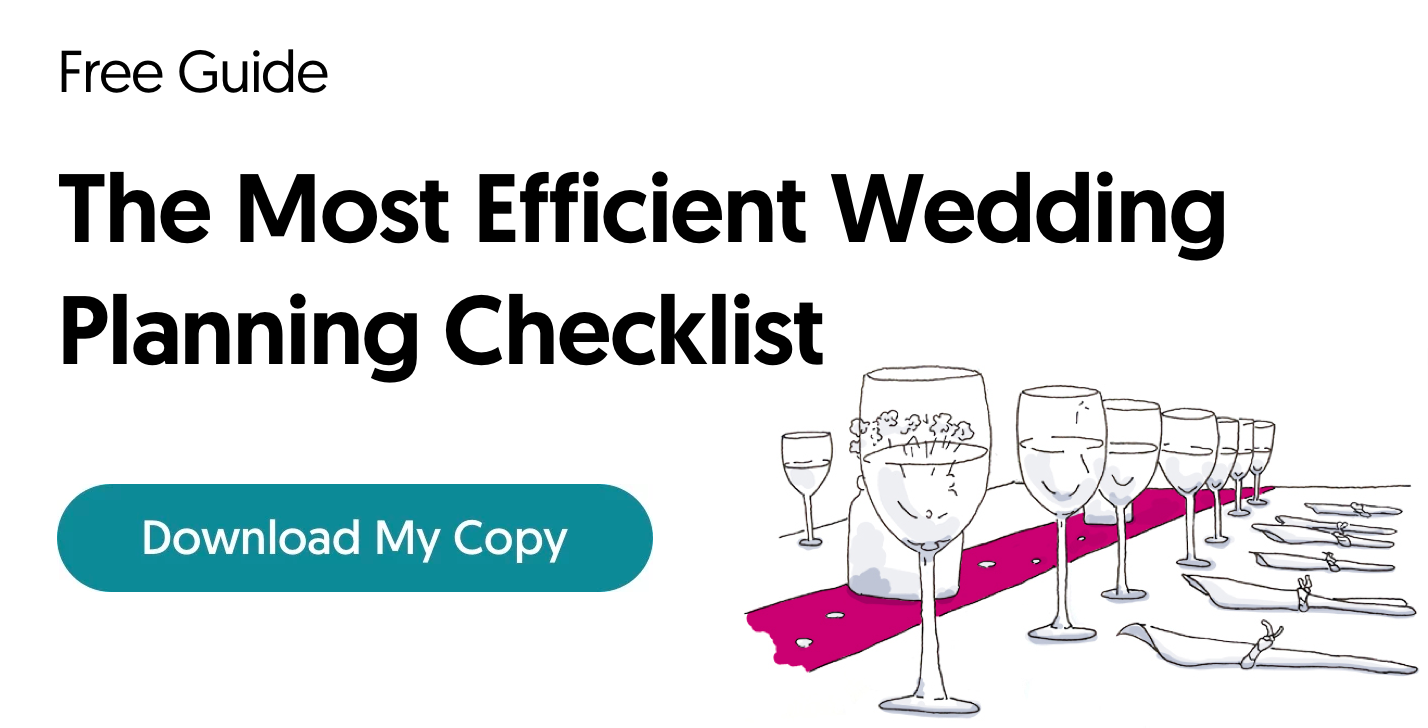
Wedding Contracts for Events 101
Protect your business, get on the same page with clients, and outline every project with the help of an event or wedding contract. This paperwork will serve as the foundation for decision making and provide much-needed guidance during the event planning process.
Plus, clients tend to appreciate it when their event planner presents them with professional and organized documentation, especially when it helps clear up their lingering questions and set realistic expectations for the event.
Here’s everything you need to know about how to make a simple event contract along with templates and examples to help get you started.
- Why are contracts important for an event?
- How do you write a contract agreement?
- Key terms to know for event & wedding contracts
- A simple event contract template
- Best event contract examples

Why are contracts important for an event?
Getting everything written down on paper is essential should any legal or payment issues come up during the event planning process. Plus, it helps set up clear boundaries and expectations for both parties from the get-go.
And, should anything unexpected happen, your contract will relieve you of any possible harm to your business as well as costly fees. Here are some other great benefits to having an event contract:
- Contracts set you up for success. This year’s event trends show that event planners are in high demand and are having to book out farther in advance than ever before. Which means getting a contract in place now will make it easier to remember what you agreed initially since you can refer back to it when you do get started.
- Contracts help identify important company performance metrics. You can use them as a tool to find areas of strength or weaknesses.
- Contracts provide a guide for what to do in any circumstance. Which is why Entreprenuer.com calls contracts the business owner’s best friend.
You technically can work without a contract. But if you do, you’ll need to highly document every client communication on and offline, neatly store all other relevant papers, and basically everything else around the project you can think of.
Which is why having an agreement signed by both parties at the start of the project makes everything easier and less emotion-driven along the way.
How do you write a contract agreement?
Using an event contract template (like the one we’ve outlined below), you should write a contract agreement with as much detail as possible. No matter how many times you’ve previously discussed it, or what you might consider to be common knowledge, it pays to write every single specification down.
Because event planners, in general, offer a wide variety of services, your clients might have some expectations regarding what you’d be willing to do for them or what’s included in your fee.
Which is why simply listing out services or other pertinent contract items isn’t enough. You must go through and completely fill out every relevant bullet point with as much detail as possible.
Once you’ve filled out your contract agreement, run your draft by a trusted resource, business manager, or lawyer. They’ll be able to confirm how legally binding the agreement is and help you reword things to better protect your business during the transaction.

Key terms to know for event & wedding contracts
As you begin writing your first event planning contract, these terms will help you better understand what each section is for, what you should include, and how you’ll use them throughout the document.
- Force Majeure Clause. This is also known as a cancellation policy. What happens when circumstances beyond your control delay or cancel the event? How and when will your clients pay you for your work?
- RFP or Request for Proposal. This add-on document requests proposals from vendors through a bidding process. For a wedding, these might include photographers, bakers, and live entertainment.
- Effective Date. This is the day, month, and year that you and the client agree to begin working on the project. This can also include stipulations like deposits due beforehand.
- Inclusive Rates. This is the rate you’ll require for your services and includes all foreseeable expenses (including taxes, fees, and possible overtime).
- Indemnity. If you need to take legal action, this contract section outlines who is responsible for paying legal counsel bills. Indemnity is not the same as liability, however.
- Change Order. Change orders define what a Client can additionally request from the event planner after the project begins, which is why it is so important to define the scope of work in every contract you make.
- Rider. Although the insurance industry primarly uses this term, a rider can also mean any additional provision made to a contract that alters the original terms and is agreed upon by both parties.
- Severability. If you find any of the tasks outlined in the contract to be illegal or impossible to accomplish, this provision states that you’ll still complete the rest of the agreement (minus the questionable requests).
- Legal and Binding Agreement. This contract section outlines that the finalized agreement is valid under both state and federal law.
- Master Account. The master account is a record of all billing that your client must pay by a given date. If you’re subcontracting wedding vendors, for example, you’ll likely include their fees in this provision.
- Governing Law and Jurisdiction. Don’t skip this section – it defines what state laws and which courts are used to determine how parties can follow up legally with the contract. For example, if you’re based in California but your client lives in Washington and has hired you to plan their Hawaiin destination wedding, you’ll want to clearly define which territories govern the contract.
- Guarantee. While certainly not required, a guarantee is a formal way of saying to your client that no matter what happens, you will provide certain services or otherwise offer adequate compensation for their event.
A simple event contract template
Step 1: Terms & Conditions
This section will answer each of the following questions regarding the basics of the events and what you will do for your client:
- What type of event is it?
- When is the event?
- What is the event location?
- What is the purpose of the event?
- Who is hosting the event?
- What general role you will serve in the process?
You can also use this section as an opportunity to outline your event planning schedule from start to finish as well as establish lines of communication and relevant contact information.
Consider also including definitions of key terms (like Client and Order) that you will use as a shorthand throughout the rest of the agreement.
[Tweet “Protect your business, get on the same page with clients, and outline every project with the help of an event contract.”]
Step 2: General Company Information
This section is all about you. What do you offer to your clients, what are your hours of operation, where is your business based, and what your clients can expect when they work with you are all great additions to this space.
If you are working with a team, be sure to include everyone’s names, titles, contact info, and what roles they will play (if any) in this project.
Step 3: Services and Products
Dedicate this section to explaining the scope of your services. Also known as the things you will do and the things you won’t do (both are important). Business professionals at NYU also say you should you include each of the following in your scope of work:
- 1-2 paragraphs outlining why the client has hired you and what problems you intend to solve for them.
- 2-3 sentences defining what the goal of the project is for you.
- A detailed and measurable description of each individual project objective that fits under your main goal along with what the corresponding deliverable your client can expect once the task is complete.
- A project timeline with key dates, meetings, and progress reports scheduled in.
It might seem like a lot of work, but adding in these minute details will really set your project up for success.
Step 4: Payment
The payment section will soon become your favorite because it details answers to all financial questions pertaining to the project.
Use simple language to make this section crystal clear for both you and the client. This segment should outline a few things. How much your services cost, the total estimate for the project, the time period when you’ll send the final invoice, when payment will be due, and how you’ll handle late payments (if they come up).
You should also be upfront about deposits and reiterate that work cannot begin until the deposit is officially in your possession.
When deciding on a payment schedule, choose whatever works best for your cash flow. And don’t forget to include taxes and relevant fees in with your total!
Step 5: Cancellation Fees
Sometimes, no matter how well you do your job, your clients will cancel their events. No matter how much you two click or how many hours you put in, you might still see these reasons for cancellation:
- Lack of funding.
- Low projected attendance.
- Unforeseen venue disputes.
- Bad weather.
- Permit or other important paperwork is missing or late.
- Personal or public health issues.
And in order to safeguard yourself from these normal event planning hiccups, you’ll want to include a detailed explanation of how much it costs to cancel, how much advance notice you’ll need (sometimes emergencies don’t allow for this but it’s good to give them a heads up anyway).
You’ll also need to include when cancellation fees will be due and any penalty that may result from late cancellation fee payments.
Additionally, no cancellation fee section would be complete without making it clear who may terminate the agreement (you may want to reserve this right depending on the client and their event vision). And if the project or agreement does come to an end before the event itself, you’ll have to make a decision. Outline your vision for whether or not you’ll continue working on a possible rescheduled event. If you do, also make sure to outline how payments will be covered either way.
By the way, if the client does cancel the event, make sure you get a statement from them about their decision in writing the same day, just in case you need to settle any payment disputes later on.
Step 6: Legal
Here is where you’ll put each of the following sections:
- Legal and Binding Agreement
- Governing Law and Jurisdiction
- Severability
- Indemnity
- Liability
- Guarantee
We’ve already outlined the meaning of these terms in the section above, but as a small business owner, it wouldn’t hurt to brush up on the basics of contract law before writing one of your own.
Step 7: Signatures
Last but not least, make sure you have the appropriate signatures from all key event stakeholders involved in the agreement. When you send the draft to everyone, invite them to take their time and ask questions or suggest changes where applicable.
You cannot take this step lightly. Yes, you’ll have to option to make changes or additions later on, but it’s best to eliminate the time suck that is back and forth negotiations and paperwork once the event planning is already underway.

7 Best event contract examples
Each of the contract samples has valuable information for downloaders–and some even have unique features we just had to share with you!
1. Docsketch’s Free Event Planning Contract Sample
This simple two-pager is downloadable, approved by legal experts, and provides a basic outline for any type of event.
2. Template.net’s Event Contract
Featuring customizable design, this contract example is available for Google Docs, MS Word, and Pages.
3. Doc Formats Private Event Agreement
This template offers more event-specific detail, specifically in the cancellation policy, guest guarantee, and additional event contractors sections. These additions make it well-suited for larger or more complex corporate events.
4. HLoom’s Wedding Event Planner Contract
This contract’s sample terms are in plain language with less emphasis on jargon, which is perfect for dealing with individual bridal parties or groups. Sometimes these groups aren’t used to handling event contracts. An example of this is parents throwing a child’s birthday party or first-time bachelorette groups who are new to the process!
5. KaLeigh Welch’s Wedding Contract
Although KaLeigh Welch is a wedding photographer, her contract format is a really interesting example of wedding contracts. Located directly on her professional website, guests can review, date, and initial this wedding contract in minutes, streamlining the process for everyone involved.
This works because KaLeigh offers a single contract for all her packages with terms that do not vary and are not up for negotiation. If you currently only offer day-of coordinator services or simple wedding consultations, this approach may work for you as well. But more complex services or special add-ons will need a new contract for every project.
6. Etsy’s Downloadable Wedding Contracts
If you’re looking for certain designs or have a contract aesthetic in mind, Etsy currently sells over 1,900 wedding contract downloads for you to choose from. There are specific options for photographers, wedding hairdressers, and other niche wedding-related services. Prices range from a few dollars for simplified templates to about $65 for full package, legally verified contract bundles.
7. Gather’s Event Contract Sample
Another simple and straightforward contract, Gather makes this list for its super user-friendly features and customizable logo for a nice professional touch.
Read these next for more about event planning contracts
Interested in learning more about event planning contracts? Then check out our helpful advice for getting the most out of venue RFPs or the best ways to negotiate hotel (and other venue) contracts.

